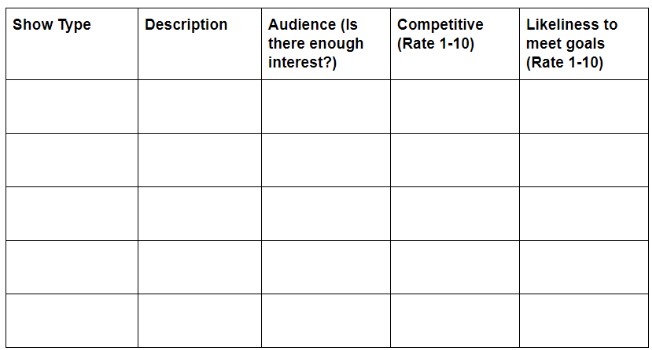Written By:
Will Purcell
Are you looking to start a podcast for your business? It’s critical to evaluate any pitfalls or potential challenges before moving forward. By taking the time to justify a podcast, you’ll also highlight:
-
The best podcasting ideas (and any gaps that may exist)
-
Business goals for the podcast
-
Likelihood of success
Ultimately, these factors all contribute to the bottom line your stakeholders care about: return on investment.
Making the case to launch a podcast for your business may seem like a challenging task, but it doesn’t have to be. In the following article, we’ll take you through the basics of how to justify a podcast for your outreach efforts and ultimately, present these findings in a way that’s both transparent and tangible for your company’s decision makers to understand.
Need help launching a podcast for your business? Download our workbook!

When it comes to justifying a podcast for your business, it’s important to generate the best ideas and present them in the most transparent way possible. That’s why it’s best to start with understanding the “why” for your podcast.
Finding motivation for your podcast: What Questions Should you ask?
It may seem simple, but if you don’t have a solid answer as to why a podcast is necessary for your business, you’ll never have success and in most cases, it’s unlikely the podcast will ever be approved.
So, where should you start? Begin with these three questions:
1. Personally, what impact do you want the podcast to have?
Regardless of the industry, it’s always a good idea for professionals to branch out and learn new skills. This is further evidenced by the fact that stakeholders often invest in programs and training that helps their employees become more diverse and well-rounded.
Fortunately, starting a podcast can offer an invaluable number of opportunities for both personal and career growth by incorporating relevant, comprehensive skills. Some of these skills include:
- Public Speaking
- Writing
- Creative Thinking
- Technical/Computer Expertise
After looking at these basic skills: Do you see any gaps or areas of needed growth for your career development? What about your team or department?
Identifying gaps allows for a better understanding of how exactly a podcast can help you and members of your team develop professionally.
And, more importantly, your stakeholders will have a transparent view of how launching a podcast will directly impact the career growth of each employee and improve efficiency overall.
2. What impact do you want the podcast to have for your business?
Perhaps the most important aspect of getting stakeholders to “buy-in” to a podcast is the direct impact it will have on your business overall.
For a solid list of benefits podcasting can offer a business, check out our article 12 Benefits of Podcasting for Business written by Pepperland Inbound Marketing Specialist, Ryan Slyvestre.
Among the list of benefits Ryan mentions, perhaps the most important is the personal connection that a podcast builds with your clients. That familiarization builds trust and ultimately, leads to a higher ROI for your operations.
Podcasting can open up more avenues of communication between you and your audience and make more paths for them to buy from you.
-Ryan Sylvestre
Also, it’s impossible to ignore the steep rise in podcast listenership over the past few years. In fact, the number of podcast listeners in the U.S. alone is projected to double from 2019 to 2023.
Given that podcasts are so popular, it’s important to ask how starting one can have a direct impact on your business. In general, think about the resources your business offers customers and clients. A podcast simply provides another avenue for your business to showcase its services in an entertaining, informative, and creative way.
3. What do you want your company to exemplify in the podcast beyond your services?
As previously mentioned, one of the benefits of podcasting includes the freedom to be creative. Think about the factors that make your company unique. These factors could include:
- Work Environment
- Company History
- Clientele
- Industry Culture
It’s important to take these unique factors into consideration when making a case for a business podcast because it creates another avenue for customers to become familiar with your company.
And, as previously mentioned, familiarity builds trust. Especially for companies who build their services around selling an experience, rather than just a product, podcasts offer an unparalleled opportunity for you to showcase what makes your company fun and unique.
Idea Generation Table
After answering the questions above, you’ll have a better understanding of the motivation behind your podcast. Next, you’ll want to begin the process of generating ideas.
And, much like any other business plan, it’s important to keep more than one idea in mind. Additionally, ideas and topics should be flexible and realistic, but also competitive with a chance to meet your goals.
Below, we’ve provided an idea generation table, which helps quantify your proposed topics through:
- Audience Size
- Competitiveness
- Show Type
- Likeliness to Meet Goals
These factors combine to predict which ideas will have the biggest return on investment. Below, we’ve provided explanations and examples for each.

Show Type
It’s important to take the proposed show type into consideration before moving forward with any ideas. A show’s format and structure is important because each variation carries different requirements for success.
For instance, will your show incorporate an interview-only style podcast? Or, will a panel discussion be better for your proposed topic? These two formats may seem simplistic, but there are significant differences between the two.
An interview-only style podcast requires a dedicated show host to deliver solid interviews along with a continuous list of guests to keep the show relevant and interesting. For panel-type shows, a greater investment into equipment is needed to keep a professional sounding podcast.
If you’re unsure about which show type works best for you, read our blog on structuring a podcast to gain a better understanding of the requirements and set-up associated with the 5 basic show formats.
Description
When it comes to your show’s description it’s important to ask: Is it concise and understandable? In other words, when potential listeners search for potential topics covered by your podcast: will they understand the basic premise of your show?
Considering the average human attention span has dramatically fallen in the current digital age, your podcast better grab people’s attention early and often.
Furthermore, your stakeholders will need a transparent understanding of your podcast as well. For a best practice, it’s important to leverage the unique factors associated with your podcast idea and present them in a way that quickly describes your goals and services.
Audience
When evaluating a potential audience, it’s important to consider how much interest currently exists within your topic. Granted, virtually any podcast will need to progressively develop an audience when first starting out. However, a podcast featuring a topic that already generates a great deal of interest will have an easier time establishing an audience than others.
If you’re not sure about an audience’s interest, start by asking potential listeners. Specifically, utilize online resources to survey listeners to gain a better understanding of your topic’s relevancy. Some of these resources include:
- Quora
- Survey Monkey
- DataBox
- Google Forms
These resources can help you gain a better understanding of your topic’s interest and more importantly, provide the foundation for a solid listener persona.
Competitive
Similar to evaluating an audience’s interest, you should conduct ample research into other competing podcasts when generating ideas. For instance, if you plan on hosting a news-focused podcast, minimal research will show a pretty substantial existing field of similar shows and competition.
That’s not to say you shouldn’t pursue that idea, it does, however, offer a realistic outlook on how difficult it will be to establish a high ranking podcast in that particular category. It’s best to incorporate a ranking system between 1-10 to gain a better understanding of the competition.
Evaluating competition can also help in generating new ideas too. Reference your own ideas: Are there any gaps? Are other podcasts filling these gaps in a way you can emulate?
Much like general business practices, it’s important to continually evaluate your competition to identify any gaps or shortcomings within your own operation.
Likeliness to meet goals
When taking all of these factors into consideration it’s important to ask: How likely are you to meet your goals with this podcast idea? Simply put, it’s about evaluating the most important factors involving a podcast idea and weighing the strengths and weaknesses of each.
As previously mentioned, it’s important to evaluate multiple podcast ideas (at least 3-5) in order to find which one(s) will be most likely to succeed.
Presenting ideas that are most likely to succeed will not only help establish the best podcast possible, but will also provide an excellent case for stakeholders as well.
Make the Case for your Business’ Podcast
As you can see, there are a number of different factors contributing to the overall probability of a podcast’s success. That’s why it’s important to identify as many ideas as possible and weigh the strengths and weaknesses of each.
Need help with your podcast ideas? Try incorporating a service that specializes in podcasting.
These services use effective tools, resources, training, and outreach to ensure your podcast’s launch is successful. Furthermore, a podcasting service will partner with your company to provide solutions to any challenges throughout a podcast’s campaign as well.
By doing this, both you and your stakeholders will have the best possible options for launching a podcast in a way that’s transparent, easy to understand, and ultimately generates a successful return on investment.







